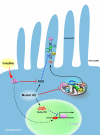Besides Huntington's disease, does brain-type creatine kinase play a role in other forms of hearing impairment resulting from a common pathological cause?
- PMID: 21685512
- PMCID: PMC3164373
- DOI: 10.18632/aging.100338
Besides Huntington's disease, does brain-type creatine kinase play a role in other forms of hearing impairment resulting from a common pathological cause?
Abstract
Hearing impairment following cochlear damage due to noise trauma, ototoxicity caused by aminoglycoside antibiotics, or age-related cochlear degeneration was linked to a common pathogenesis involving the formation of reactive oxygen species (ROS). Cochleae are more vulnerable to oxidative stress than other organs because of the high metabolic demands of their mechanosensory hair cells in response to sound stimulation. We recently showed that patients and mice with Huntington's disease (HD) have hearing impairment and that the dysregulated phosphocreatine (PCr)-creatine kinase (CK) system may account for this auditory dysfunction. Given the importance of noninvasive biomarkers and the easy access of hearing tests, the symptom of hearing loss in HD patients may serve as a useful clinical indicator of disease onset and progression of HD. We also showed that dietary creatine supplementation rescued the impaired PCr-CK system and improved the expression of cochlear brain-type creatine kinase (CKB) in HD mice, thereby restoring their hearing. Because creatine is an antioxidant, we postulated that creatine might enhance expression of CKB by reducing oxidative stress. In addition to HD-related hearing impairment, inferior CKB expression and/or an impaired PCr-CK system may also play an important role in other hearing impairments caused by elevated levels of ROS. Most importantly, dietary supplements may be beneficial to patients with these hearing deficiencies.
Conflict of interest statement
The authors of this manuscript have no conflict of interest to declare.
Figures

Similar articles
-
Dysregulated brain creatine kinase is associated with hearing impairment in mouse models of Huntington disease.J Clin Invest. 2011 Apr;121(4):1519-23. doi: 10.1172/JCI43220. Epub 2011 Mar 14. J Clin Invest. 2011. PMID: 21403395 Free PMC article.
-
Enhancement of brain-type creatine kinase activity ameliorates neuronal deficits in Huntington's disease.Biochim Biophys Acta. 2013 Jun;1832(6):742-53. doi: 10.1016/j.bbadis.2013.02.006. Epub 2013 Feb 15. Biochim Biophys Acta. 2013. PMID: 23416527
-
Impaired brain creatine kinase activity in Huntington's disease.Neurodegener Dis. 2011;8(4):194-201. doi: 10.1159/000321681. Epub 2010 Dec 3. Neurodegener Dis. 2011. PMID: 21124007 Free PMC article.
-
The therapeutic role of creatine in Huntington's disease.Pharmacol Ther. 2005 Nov;108(2):193-207. doi: 10.1016/j.pharmthera.2005.04.008. Epub 2005 Aug 1. Pharmacol Ther. 2005. PMID: 16055197 Review.
-
The role of oxidative stress in Huntington's disease: are antioxidants good therapeutic candidates?Curr Drug Targets. 2014 Apr;15(4):454-68. doi: 10.2174/1389450115666140115113734. Curr Drug Targets. 2014. PMID: 24428525 Review.
Cited by
-
Effects of obesity on protein kinase C, brain creatine kinase, transcription, and autophagy in cochlea.Metab Brain Dis. 2017 Jun;32(3):735-742. doi: 10.1007/s11011-017-9962-y. Epub 2017 Jan 31. Metab Brain Dis. 2017. PMID: 28144885
-
An Oral Combination of Vitamins A, C, E, and Mg++ Improves Auditory Thresholds in Age-Related Hearing Loss.Front Neurosci. 2018 Jul 31;12:527. doi: 10.3389/fnins.2018.00527. eCollection 2018. Front Neurosci. 2018. PMID: 30108480 Free PMC article.
-
Comparison of Genomic and Epigenomic Expression in Monozygotic Twins Discordant for Rett Syndrome.PLoS One. 2013 Jun 21;8(6):e66729. doi: 10.1371/journal.pone.0066729. Print 2013. PLoS One. 2013. PMID: 23805272 Free PMC article.
-
Hearing Loss in Neurological Disorders.Front Cell Dev Biol. 2021 Aug 11;9:716300. doi: 10.3389/fcell.2021.716300. eCollection 2021. Front Cell Dev Biol. 2021. PMID: 34458270 Free PMC article. Review.
-
Protective effect of creatine on amikacin-induced ototoxicity.Braz J Otorhinolaryngol. 2022 Sep-Oct;88(5):651-656. doi: 10.1016/j.bjorl.2020.09.002. Epub 2020 Oct 4. Braz J Otorhinolaryngol. 2022. PMID: 33121925 Free PMC article.
References
-
- Martin JB, Gusella JF. Huntington's disease. Pathogenesis and management. N Engl J Med. 1986;315:1267–1276. - PubMed
-
- Orth M, Cooper JM, Bates GP, Schapira AH. Inclusion formation in Huntington's disease R6/2 mouse muscle cultures. J Neurochem. 2003;87:1–6. - PubMed
-
- Sathasivam K, Hobbs C, Turmaine M, Mangiarini L, Mahal A, Bertaux F, Wanker EE, Doherty P, Davies SW, Bates GP. Formation of polyglutamine inclusions in non-CNS tissue. Hum Mol Genet. 1999;8:813–822. - PubMed
-
- Tanaka M, Machida Y, Niu S, Ikeda T, Jana NR, Doi H, Kurosawa M, Nekooki M, Nukina N. Trehalose alleviates polyglutamine-mediated pathology in a mouse model of Huntington disease. Nat Med. 2004;10:148–154. - PubMed
Publication types
MeSH terms
Substances
LinkOut - more resources
Full Text Sources
Medical
Research Materials
Miscellaneous

